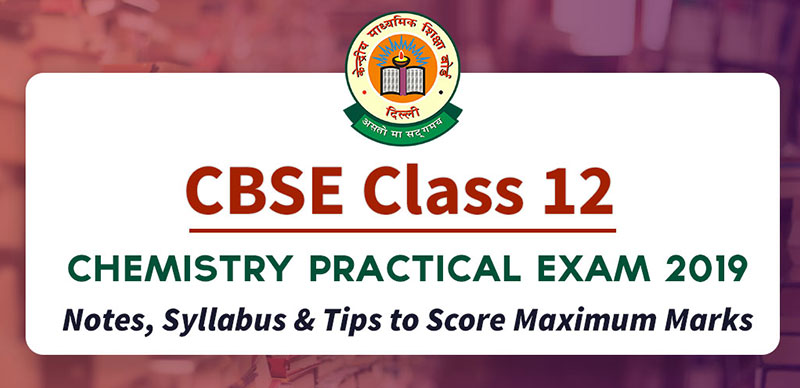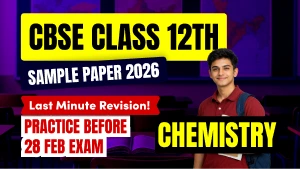
CBSE Class 12 Chemistry Practical Exam 2019 : Notes, Syllabus and Tips to Score Maximum Marks
CBSE Syllabus for Class 12 Chemistry Practical Exam 2019 is available here. In this article, you will get complete details related to CBSE Class 12 Chemistry Practical Exam i.e., evaluation scheme, list of experiments, projects work etc.
At the end of this article, you will also get important tips to score well in CBSE Class 12 Chemistry Practical Exam.
Evaluation Scheme for Class 12 Chemistry Practical 2019
|
Volumetric Analysis |
08 |
|
Salt Analysis |
08 |
|
Content Based Experiment |
06 |
|
Project Work |
04 |
|
Class record and Viva |
04 |
|
Total Marks |
30 |
Syllabus for Class 12 Chemistry Practical 2019
Micro-chemical methods are available for several of the practical experiments. Wherever possible, such techniques should be used.
A - Surface chemistry
(a). Preparation of one lyophilic and one lyophobic sol
Lyophilic sol - starch, gum and egg albumin
Lyophobic sol- aluminium hydroxide, ferric hydroxide, arsenous sulphide.
(b). Dialysis of sol-prepared in (a) above.
(c). Study of the role of emulsifying agents in stabilizing the emulsion of different oils.
B - Chemical Kinetics
(a). Effect of concentration and temperature on the rate of reaction between Sodium Thiosulphate & Hydrochloric acid.
(b). Study of reaction rates of any one of the following:
(i). Reaction of Iodide ion with Hydrogen Peroxide at room temperature using different concentration of Iodide ions.
(ii). Reaction between Potassium lodate, (KIO3,) & Sodium Sulphite: (Na2SO3,) using starch solution as indicator (clock reaction).
C - Thermochemistry
Any one of the following experiments
(i). Enthalpy of dissolution of Copper Sulphate or Potassium Nitrate.
(ii). Enthalpy of neutralization of strong acid (HCl) and strong base (NaOH).
(iii). Determination of enthalpy change during interaction (Hydrogen bond formation) between Acetone and Chloroform.
D - Electrochemistry
Variation of cell potential in Zn/Zn2+ || Cu2+/Cu with change in concentration of electrolytes (CuSO4 or ZnSO4) at room temperature.
E - Chromatography
(i). Separation of pigments from extracts of leaves and flowers by paper chromatography and determination of Rf values.
(ii). Separation of constituents present in an inorganic mixture containing two cations only (constituents having large difference in Rf values to be provided).
F - Preparation of Inorganic Compounds
(i). Preparation of double salt of Ferrous Ammonium Sulphate or Potash Alum.
(ii). Preparation of Potassium Ferric Oxalate.
G - Preparation of Organic Compounds
Preparation of any one of the following compounds
(i). Acetanilide
(ii). Di -benzal Acetone
(iii). p-Nitroacetanilide
(iv). Aniline yellow or 2 - Naphthol Aniline dye.
H -Tests for the functional groups present in organic compounds:
Unsaturation, alcoholic, phenolic, aldehydic, ketonic, carboxylic and amino (Primary) groups.
I - Characteristic tests of carbohydrates, fats and proteins in pure samples and their detection in given food stuffs.
J - Determination of concentration? Molarity of KMnO4 solution by titrating it against a standard solution of:
(i). Oxalic acid,
(ii). Ferrous Ammonium Sulphate
(Students will be required to prepare standard solutions by weighing themselves).
K - Qualitative analysis
Determination of one cation and one anion in a given salt.
Cation:- Pb2+, Cu2+ As3+, Al3+, Fe3+, Mn2+ , Zn2+, Cu2+, Co2+, Ni2+, Ca2+, Sr2+, Ba2+, Mg2+, NH4+
Anions:- CO3 2‒, S2‒, SO32‒, SO42‒, NO2‒, NO3‒, Cl‒, Br‒, I‒, PO43‒, C2O42‒, CH3COO‒
(Note: Insoluble salts excluded)
Project work -
Scientific investigations involving laboratory testing and collecting information from other sources.
A few suggested Projects.
• Study of the presence of oxalate ions in guava fruit at different stages of ripening.
• Study of quantity of casein present in different samples of milk.
• Preparation of soyabean milk and its comparison with the natural milk with respect to curd formation, effect of temperature, etc.
• Study of the effect of Potassium Bisulphate as food preservative under various conditions (temperature, concentration, time, etc.)
• Study of digestion of starch by salivary amylase and effect of pH and temperature on it.
• Comparative study of the rate of fermentation of following materials: wheat flour, gram flour, potato juice, carrot juice, etc.
• Extraction of essential oils present in Saunf (aniseed), Ajwain (carum), Illaichi (cardamom).
• Study of common food adulterants in fat, oil, butter, sugar, turmeric power, chilli powder and pepper.
Students should study the laws and theories before performing the experiments. Students are suggested to revise their practical notes before their examination.
Chemistry Practical Class 12 experiments are given here so that students can prepare for their examination efficiently.
| Experiments | Download Now |
| Experiment 1 | Click Here |
| Experiment 2 | Click Here |
| Experiment 3 | Click Here |
| Experiment 4 | Click Here |
| Experiment 5 | Click Here |
| Experiment 6 | Click Here |
| Experiment 7 | Click Here |
| Experiment 8 | Click Here |
| Experiment 9 | Click Here |
| Experiment 10 | Click Here |
| Experiment 11 | Click Here |
| Experiment 12 | Click Here |
| Experiment 13 | Click Here |
| Experiment 14 | Click Here |
| Experiment 15 | Click Here |
| Experiment 16 | Click Here |
| Experiment 17 | Click Here |
Here are few quick tips which will help you to score well in CBSE Class 12 Chemistry Practical exam 2019:
• Have an in depth understanding of concepts behind the experiments
• Learn the procedure to conduct the experiment
• Different experiments have different procedures. So, you should know how a particular experiment is to be carried out and what is the apparatus needed for that experiment.
• You must also know the name and uses of the apparatus present in the Chemistry lab
• Don't just cram the readings
• Principle and Methodology are the frequently asked questions during viva.
• Remember important chemical reactions
• Be confident during the practical examination
• Thoroughly read the complete theory behind the experiment
• Revise your notes (also refer Class 12 Chemistry NCERT textbook also)
• Don’t be nervous at the time of experiment & write the important steps before starting the practical (you can also draw a flowchart)
• Consult with the teacher or lab attendant whenever you have any doubt







 Profile
Profile Signout
Signout












 Quiz
Quiz
 Get latest Exam Updates
Get latest Exam Updates 










